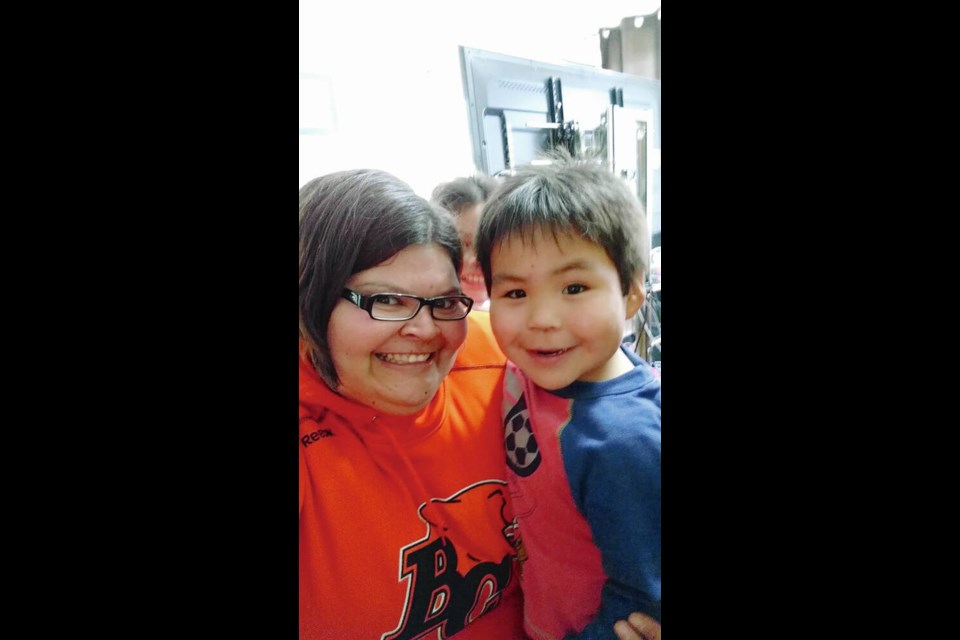The Port Alberni foster mother of an Indigenous boy later murdered by his mother and stepfather said child services asked her twice to take him back after he was abruptly removed from her care.
Amanda Watts, a First Nations foster mother, looked after Dontay Patrick Lucas and his sister Mia for six months in 2015.
Dontay, 6, died on March 13, 2018, of blunt force trauma to the brain after being transitioned back into the care of his mother by USMA Nuu-chah-nulth family and child services.
His mother, Rykel Charleson, and stepfather Mitchell Frank deprived the little boy of water, food and sleep, hit him, bit him and forced him to hang by his knees from the top of a door until he fell. The couple, who were originally charged with first degree murder, pleaded guilty to manslaughter and are to be sentenced in Port Alberni on May 16 and 17.
Watts said she was not a certified foster parent when she was asked to look after Dontay. “This was my first time ever doing foster care and I absolutely loved this little man,” said Watts.
“The first time I met him, he was across the parking lot and the social worker was standing there with garbage bags and pointing at me. And he ran across the parking lot and called me ‘Mum.’ He was so compassionate and loving.”
Mia was brought into her care more slowly. At first, she stayed one night a week, then two, then three.
“They both were awesome,” said Watts, who taught the children to call her “Auntie.”
Watts believes Dontay came to her for a reason. The day after he arrived, she discovered she was pregnant with her first child.
“He brought lots of joy to my house and taught me how to be a mum,” she said.
Watts enrolled the children in the Haahuupayak elementary school.
One day, the children were talking on the phone to their mother and Watts overheard her telling them that they were going home to her.
Later that night, someone from USMA called her to say the children were going to a family treatment centre with their mother.
“I told them I already know because the mum told the kids already. And I told them I disagreed with finding out that way,” said Watts. “Then it happened so quick. Within a couple of days, they were out of my house.”
However, within a week, USMA called Watts to see if she would take them back.
“I said: ‘Absolutely, I’ll take them back. Their beds are still at my house.’ ”
But they were not returned to her care, said Watts, who was never told what happened.
“I had no communication as to why they needed to be placed back with me. And I waited for two days and they phoned and said: ‘Oh, they’re going to a different foster mum.’ ”
Then, within a year, USMA asked her for a second time if she would take Dontay and Mia back. Watts said she was willing, but because she and her husband had a new baby, she let her husband decide.
“He chose to say no at that time. I said I was sorry I couldn’t take him back. I think it was after that they went back to their mum.”
Watts wondered if Dontay was transitioned back home because USMA had nowhere else for him to go.
“It seemed weird that they offered him back to me twice,” said Watts.
“Why did this happen? And if he was home, why wasn’t there more investigating? Why weren’t there more visits and when he was missing school, why wasn’t USMA asking why? Do they check on their kids who are transitioned back home? Do they get reports from school?”
Child services have to be more vigilant when they are transitioning children back into the care of their parents, said Watts. “He fell through the cracks and he fell through them hard.”
The last time Watts saw Dontay, he was at the pool with his mother and grandmother. She noticed he was wearing a short-sleeved black shirt and wondered why.
“I didn’t want to overstep and go up and approach him,” said Watts, who was busy playing with her daughter. “I waved at him and said: ‘Auntie loves you.’ ”
He died a few days later.
“It broke my heart to pieces because he was just amazing. He didn’t deserve any of that,” she said, through tears.
“It’s a sad truth but his story is finally being told. It’s just waited such a long time for anything to happen. That’s the only thing that can bring me peace.”
Judith Sayers, president of the Nuu-chah-nulth Tribal Council, did not respond to a request for an interview.
In June 2020, a review of Dontay’s death by the Ministry of Children and Family Development — which reviews all deaths in children in care — confirmed he and his family were receiving services from USMA, which is referred to in the review as the Delegated Aboriginal Agency (DAA). Although Dontay is not named in the review, the date of death and circumstances are similar.
“The DAA supported a reunification plan for the children and the parents, gradually increasing their time together until, shortly before the child’s death, the children returned to their parents’ care,” the ministry report says.
“During this period of reunification, the DAA received multiple reports concerning neglect and abuse of the children while in their parents’ care: none of the reports were assessed or addressed according to policy, and the plan for reunification continued, leaving the children at risk of future harm.”
Following the review, the agency developed an action plan to self-audit its adherence to policy, create tools to support case documentation and clinical supervision, ensure care plans are current and review policy and procedures with staff, the review says.



